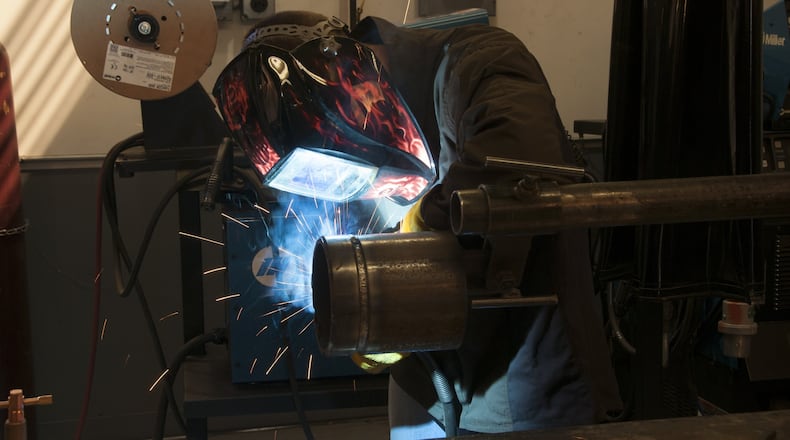That’s good timing. The company celebrates its 100th anniversary this year.
Hobart Brothers Co. was incorporated in 1917 to make engineering, manufacturing and specialized electrical equipment. Today, it makes welding “consumables” — stick electrodes, solid wire, flux-cored wire and metal-cored wire.
Products go from the company’s plant in Troy all around the world, Knoll said.
“We deal with the productivity of the country,” Knoll said. “We are really helping drive the effectiveness of manufacturing, not only in the U.S., but North America in general and around the globe.”
“We’re celebrating our past, but we’re inventing our future,” said Hobart spokeswoman Debbie Doench.
Founder Charles Clarence Hobart was born in Vermont in 1854, going on to become the first superintendent of an electrical plant in Middletown purchased from Thomas Edison. He also dabbled in dynamos, and after a fire destroyed Hobart Electric Co. in 1895, leaders in Troy offered him a new building.
Hobart accepted, and the rest is history. Publicly traded Illinois Tool Works Inc. bought the company in 1996, but Troy remains the Hobart headquarters.
In welding, Hobart-produced consumables burn down, making the weld or the merging of metals.
The company has three “plants” or distinct manufacturing operations under one roof off Trade Square East and another plant in Traverse City, Mich. that makes aluminum wire. There’s also a Piqua facility.
Last year, the company offered voluntary early retirements, and around 10 employees took advantage of the offer. But since then, Hobart has been hiring, Knoll said. In total, the company has about 400 employees, with about 350 in Miami County.
“We have our fingers in every element of the market,” Knoll said. Stick electrodes are used in construction welding, maintenance and repair applications, he said. Solid wire can be more general. Other wires are used in heavy industries.
Ship building and heavy equipment are huge for Hobart. So when the Trump administration talks of greater defense and infrastructure spending, that talk is welcome, but talk doesn’t bolster the bottom line — sales do.
Broad industrial and commercial construction — construction that uses steel — helps Hobart. So does the building of heavy equipment.
“We do really well when people are manufacturing things or fabricating big things out of steel,” Knoll said. Automotive is a big welding market, as is the making of truck trailers.
Though it began as part of the company, the Hobart Institute of Welding Technology today is separate from Hobart the business, though both are adjacent to each other off Troy Square East. They are supportive of each other and share the same goal — finding the next generation of qualified welders.
Doench is on the board of directors of the American Welding Society. She said the number of training scholarships the society offers is “astronomical.”
“We’re really, really pushing to see how we can improve that,” Doench said. “People like Mike Rowe (host of the Discovery series “Dirty Jobs”) that are out there, are giving a message that we need to have.”
Timeline:
1854: Hobart Brothers Co. founder Charles Clarence Hobart born in Vermont.
1880s: Hobart settles in Middletown after graduating from law school in Iowa.
1895: Troy leaders offer Hobart a building for a factory.
1917: Hobart Brothers Co. incorporated.
Hobart’s business led to what are three separate entities today: Hobart Brothers Co., Hobart Food Equipment Group and the Hobart Institute of Welding Technology.
About the Author

